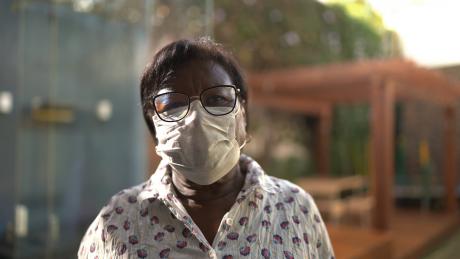Occupational therapists (OTs) are uniquely trained to provide strategies and adaptations to help people age in place. Their training focuses on studying an environment or an activity and finding ways to help that person achieve daily tasks. The OT can evaluate the impact of various health conditions and establish a way to minimize that impact and find tailored interventions to help the person to achieve or maintain their desired goals and perform meaningful activities.
The number of Americans ages 65 and older is projected to increase 47% between 2022 and 2050, from 58 million to 82 million, and the ages 65-and-older cohort’s share of the total population is projected to rise from 17% to 23%. This means that by 2030, 1 in 5 Americans is projected to be ages 65 and older. It also is estimated that 90% of those adults will have at least one chronic healthcare condition, such as arthritis, vision loss, hearing loss, depression or perhaps diabetes. Often these conditions can leave one feeling as if there is no choice but to seek long-term care or assisted living.
OTs, as skilled healthcare providers who use research and scientific evidence to provide effective interventions, can help find ways for older adults to live life to the fullest for as long as possible where they are now. The OT is trained in a holistic approach to physical challenges, emotional/ psychological issues, and environmental/social factors. Many occupational therapists also hold specialty certifications.
One such certification is called CAPS, or Certified Aging in Place Specialist. This specialty gives the occupational therapist training in home renovations (which they may recommend), and teaches them extensive knowledge of grab bar placement, door widths for wheelchairs or walkers, ramp placements and other ways to improve safety and independence.
This OT is trained to evaluate level of vision and determine ways to use remaining vision or use vision substitution strategies.
Other OTs may have a board certification in gerontology, which I define as the study of getting older and how it affects people’s feelings, thoughts and bodies, as well as how aging fits into society and culture. This certification requires them to demonstrate advanced skills, knowledge and practice experience, plus pass a written exam. These therapists primarily provide services to older adults with interventions targeting the unique needs of aging. For instance, the OT might help an older adult with cognitive impairment by creating strategies to manage medications, or work on exercises and managing pain to help decrease the impact of arthritis.
Another area of board certification is physical rehabilitation. An OT with this certification has completed multiple hours of treatment and has advanced knowledge and practice in conditions and disease progression in areas such as neurology, orthopedics, oncology, cardiopulmonary disease and mental/behavioral conditions. They also must pass a written exam. This therapist can evaluate and establish a plan of treatment using advanced, research-supported interventions.
An OT also could hold specialty certification and training in vision loss and how it impacts daily living tasks. Vision loss creates limitations in the ability to read and write, and challenges with meal preparation that can impact adequate nutrition. The person may have difficulty shopping or navigating through the community. Many may experience at least one accident related to vision impairment. OTs take a holistic approach by looking at the whole person to address not just the vision loss but also that person’s goals as they age. The OT with this specialty is trained to evaluate the level of vision and determine ways to use remaining vision or how to use vision substitution strategies. They may provide training in use of a magnifier or teach ways to operate appliances without seeing the controls. They often will make a home visit to look at areas of the home where vision loss is causing difficulty.
The specialist OT has knowledge of multiple resources to help those with vision loss safely and effectively engage in daily activities. One of the most important areas the OT can address is helping those with declining vision or health to cope with the emotional impact of such losses. The OT’s holistic perspective to interventions will provide multiple ways to improve quality of life.
OTs can help those who are aging continue to participate in daily life safely and independently. Medicare and many other insurance vendors cover OT services when referred by a healthcare provider. To seek services from an occupational therapist, ask a healthcare provider for a referral. For more information on occupational therapy, visit https://www.aota.org/about/what-is-ot.
Cheri Harbour is an occupational therapist with Specialty Certification in Low Vision Rehabilitation. She is the vision services provider at North Mississippi Retina Center in Tupelo, Miss., and has been an occupational therapist for 33 years, specializing in vision rehabilitation since 2010. Feel free to reach out to her for comments or questions at cnipp@nmhs.net.
Photo credit: Shutterstock/Pranithan Chorruangsak









